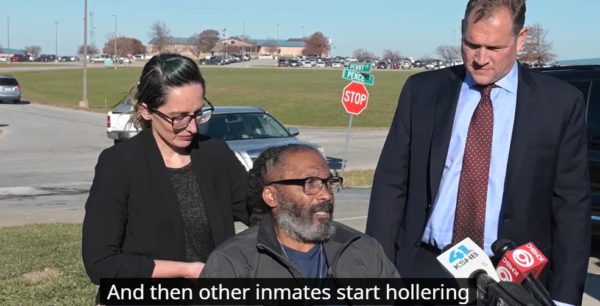A Missouri man convicted of triple murder four decades ago is able to spend this holiday season home with family after courts ruled that he was wrongfully convicted.
Despite being a victim of the state, he will not receive any form of compensation from the state in restitution. However, a GoFundMe launched by the Midwest Innocence Project over the summer with a goal of $7,500 has far surpassed the goal of the nonprofit corporation.
On Tuesday, Nov. 23, Kevin Strickland was exonerated by a “Show Me” state judge of an over 40-year murder conviction he received in 1979. Evidence that was previously ignored was brought forward by a Jackson County prosecutor and was key in gaining Strickland’s new freedom.

The state’s attorney Jean Peters Baker spoke on this victory, saying, “To say we’re extremely pleased and grateful is an understatement. This brings justice — finally — to a man who has tragically suffered so so greatly as a result of this wrongful conviction.”
As Strickland exited the Western Missouri Correctional Center, he spoke about his emotions to a group of reporters.
“I’m not necessarily angry. It’s a lot. I think I’ve created emotions that you all don’t know about just yet,” the now 62-year-old shared. “Joy, sorrow, fear. I am trying to figure out how to put them together.”
He further committed himself to work in criminal justice reform, in hopes that he can prevent this from “happening to someone else.”
The presiding judge, James Welsh, said that he was presented with “clear and convincing evidence” that “undermines the Court’s confidence in the judgement of conviction.”
The community has also rallied around Strickland’s story to help him return to some normalcy as he begins to reintegrate into society. The GoFundMe has reached the $1.1 million mark, just $100,000 short of a new $1.2 million goal. Many donors contributed $5,000 each.
One donor left a comment demanding change: “This release after so many years of incarceration without compensation is wrong on so many levels. This practice only endorses a bad practice by prosecutors and will do little to help others similarly situated. There has to be some accountability for decisions that are made even in error. Let’s change the laws!”
Another was elated for Strickland, “You deserve every penny , I can’t even imagine 43 years taken away Your a millionaire now !!”
Strickland, who has always maintained his innocence all along, was convicted without any physical evidence linking him to the murders. The court sent him away for nearly two-thirds of his life based on the testimony of one woman — who later recanted her testimony on her death bed.
His younger brothers Roland Strickland and Warren Thornton said this has been a 43-year nightmare. KSHB records Strickland as saying, “I’ll never forget that time, that day, that month. My birthday is in April. I had just turned 16, and you take my brother away for life,” he said. “He wasn’t even a man. He’ll probably tell you he was, but I mean, age-wise, he was a boy. He was 18.”
Strickland also revealed that while his brother was sentenced in 1979, he had been locked up before the trial.
Thornton shared, “He wasn’t able to see his daughter, his son. He never got to see any of my children. The way the world has changed, the simple things that we take for granted, he didn’t have had any of those. Forty-three years of advancement he’s missed out on.”
While he missed out on seeing the children in the family grow up, the most painful thing he missed out on was not seeing his mother before her death on Aug. 21, 2021. Rosetta Thornton was 85.
“She was a fighter, but right now she’s crying — she’s crying in joy, she’s smiling at him, and it’s not supposed to be like that,” Strickland said. “It’s painful that she held on for so many years to see her son come home innocent like he said he was and she couldn’t make it.”
As compensation statutes for those wrongfully convicted vary, depending on the state, Missouri, according to State Rep. Richard Brown, has “one of the strictest compensation laws in our nation.”
The state’s compensation law, according to Bakersfield.com, will only allocate payments to prisoners who proved their innocence through a specific DNA-testing statute. The state will not even offer him support in securing counseling or therapy for the trauma he experienced while in prison. Nor will he be eligible to receive social services like statewide publicly funded health care.
The prosecutor that worked to free Strickland says that Missouri should expand its compensation law, “especially when the system knows it made the mistake.”
Now, Strickland is relying on the support of the public and nonprofits, who are raising money on his behalf.
More news from our partners:


